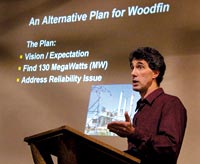Ideas for alternatives to a new power plant in Woodfin were floated at a Clean Energy Task Force forum held March 20. Addressing a crowd of about 150, local energy activists Michael Shore, Ned Doyle and David Johnson each suggested ways to make up the 130 megawatts that Progress Energy’s proposed oil-fired facility would generate.

“There is no reason that this community should accept Progress Energy’s proposal until we see an aggressive alternative proposal,” said Shore, an Asheville resident who works for Environmental Defense, a national nonprofit.
Using data from the American Council for an Energy Efficient Economy, Shore outlined a plan incorporating energy-efficiency programs and renewable sources. Based on his projections, these measures could cost less than the total expenditure associated with the plant, while saving Western North Carolina millions in the long run. “The point is that there is an alternative to meeting demand in Western North Carolina besides building a new oil-fired power plant,” he said, pointing to the success of similar demand-side-management programs in Austin, Texas. At the same time, said Shore, “It’s important to acknowledge that we do have to deal with reliability issues,” advocating what he called “profound collaboration” between Progress Energy and the community on how best to meet the demand.
Johnson, meanwhile, focused on leveling out electricity demand (according to Progress Energy, the plant would be fired up only during periods of maximum energy use). Johnson’s company, Electric Solution, markets a device called an Energy Sentry, which reduces demand spikes by cycling certain electrical appliances on and off for short periods of time. It enables households to lower their utility bills without changing their consumption habits, and in widespread use, it could shave down peak loads. An independent consultant in Raleigh is testing the product for Progress Energy, noted Johnson. The company’s community-relations manager, Ken Maxwell, confirmed this.
If utility rates were restructured, Johnson maintains, Progress Energy could actually profit by encouraging conservation. “Under the current structure, they make money by building the plant,” he said. “We have to change the way that they make money.”
Maxwell agrees that there should be collaboration with the community, but he maintains that the plant is still a necessity. “Conservation is absolutely critical—we absolutely support that,” he says. “But some of the groups have made it clear that they think they can just come up with a megawatt number and we won’t need the plant. It’s much more complicated than that.” The difficulty lies in the issue of reliability, he notes. “I think it is unfair to create the expectation that we can conserve our way out of existing demand,” says Maxwell. He compares the proposed facility to “an expensive health-insurance policy.” While the hope is that it won’t be used, he says, it’s necessary to have a reliable power source in place in case the need arises.
In addition, says Maxwell, “We’re looking at what demand-side-management programs would fit here in North Carolina,” noting that the company will release a report in early April detailing the options. He added that it remains to be seen whether there is sufficient customer interest to make launching such a program worthwhile.
Toward that end, community activists may save the company some legwork. At the forum, Doyle laid out a plan to circulate pledge sheets throughout Progress Energy’s service area to gauge individuals’ and businesses’ commitment to reducing demand. The responses would be compiled into a database and presented to the North Carolina Utilities Commission to demonstrate that there are other options for meeting demand. “Go to the Utility Commission’s Web site and read the law,” Doyle told the crowd. Under state law, the commission is required to consider alternative-energy options when weighing the need for new facilities.
Finding a solution that benefits the company as well as the community is crucial, says Doyle. “It is not any longer ‘us’ and ‘them,’” he maintains. “Things have changed. We need to look at that common ground.”



Before you comment
The comments section is here to provide a platform for civil dialogue on the issues we face together as a local community. Xpress is committed to offering this platform for all voices, but when the tone of the discussion gets nasty or strays off topic, we believe many people choose not to participate. Xpress editors are determined to moderate comments to ensure a constructive interchange is maintained. All comments judged not to be in keeping with the spirit of civil discourse will be removed and repeat violators will be banned. See here for our terms of service. Thank you for being part of this effort to promote respectful discussion.